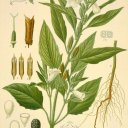Search
About Sesamum indicum
Sesame, Sesamum indicum, is considered the queen of oilseeds for its high oil content and quality, and is grown widely in tropical and subtropical areas as an important source of oil and protein. Compared to other edible oil crops such as soybean, rapeseed, peanut and olive, sesame has innately higher oil content and is thus an attractive potential model for studying lipid biosynthesis. Cultivated sesame is a self-pollinated diploid (2n=26), with an estimated genome size of 337-357Mbp, that belongs to the family Pedaliaceae and order Lamiales. Lamiales is one of the largest orders of flowering plants, with representatives found all over the world, including members such as olive, lavender and mint. This sequence is of inbreed genotype Zhongzhi No. 13.
Taxonomy ID 4182
Data source Oil Crops Research Institute of the Chinese Academy of Agricultural Sciences
Comparative genomics
What can I find? Homologues, gene trees, and whole genome alignments across multiple species.
 More about comparative analyses
More about comparative analyses
 Phylogenetic overview of gene families
Phylogenetic overview of gene families
 Download alignments (EMF)
Download alignments (EMF)
Variation
This species currently has no variation database. However you can process your own variants using the Variant Effect Predictor:






 Display your data in Ensembl Plants
Display your data in Ensembl Plants

 Update your old Ensembl IDs
Update your old Ensembl IDs

![Follow us on Twitter! [twitter logo]](/i/twitter.png)
